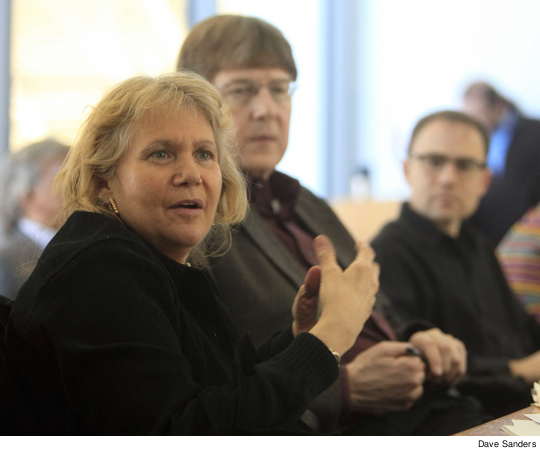 |
When Gov. Andrew Cuomo pushed through a draconian budget this spring, polls showed that the public did not support the billions of dollars in service cuts, or the tax break for the richest people in the state. But the governor had strong backing from the state’s politicians, pundits and editorial boards, and when the budget was passed Cuomo boasted that he could “feel the love.”
Now the PSC and its allies want to make him feel the heat. The union is calling on Albany to approve a supplemental budget that would provide much-needed revenues for CUNY and other vital public services. At the center of this effort is a drive to renew a surcharge on the state’s highest income tax earners, currently set to expire at the end of this year.
A SIMPLE QUESTION
On May 10, PSC members joined other educators from NY State United Teachers (NYSUT) in Albany to make the case for more funding for public education. Bob Cermele of the PSC’s Legislative Committee said his delegation posed a straightforward question to lawmakers and their top aides: “We asked how many millionaires do you have in your district? And then we told them that when people feel the pain from these budget cuts, that pain is going to be noticed a lot more than if they go ahead and increase the tax on a few millionaires.”
Cermele said lawmakers seemed open to the idea of a tax hike on the rich. “They said they might vote for the tax if it was just for millionaires,” Cermele said. “It wasn’t as negative as I thought it would be.”
On May 17, State Assembly Speaker Sheldon Silver introduced legislation for a modified “millionaires’ tax” that would not affect a penny of the first million dollars per year that a taxpayer earns. The current tax is a surcharge of 1–2.12% that kicks in on net taxable income above $200,000 for individuals or $300,000 for married couples, which affects the highest-paid 3% in New York State.
Silver’s revised “millionaires’ tax” would bring in 85% of the $5 billion per year in revenue generated by the current surcharge, according to the labor-community coalition Strong Economy for All.
$40 MILLION
Meanwhile, the PSC and NYSUT are lobbying the Legislature to authorize the University to use $40 million in higher tuition that it began charging this spring. The PSC calls on the Legislature to not hold these funds hostage while debate on SUNY’s tuition and economic development proposals such as UB2020 are debated. Cuomo has signaled some support for incremental and differential tuition proposals put forward by SUNY, but has chastised the the Republicans for their pressure tactics.
“I don’t agree with contortions – leverage this to get that,” Cuomo told the Daily News. “Deal with the issue on the merits.”
PSC members have also lobbied lawmakers to reform State Unemployment Insurance law to remove an ambiguity in the law that makes it much more difficult for adjunct faculty to collect benefits.
SEASONAL WORKERS
“We’re seasonal workers,” says Susan DiRaimo, a longtime adjunct lecturer at City and Lehman colleges who was part of the Albany delegation. Like actors, construction workers or those working in the seasonal tourism industry, adjunct faculty face frequent periods of temporary unemployment through no fault of their own. “The federal law is that when you’re not working you should be getting unemployment,” DiRaimo said.
New York State law says that part-time employees of educational institutions cannot collect unemployment benefits between academic years or terms “if they have a contract or reasonable assurance of employment in the period immediately following.” But the law is unclear about what constitutes “reasonable assurance.” (See below for more information.)
A union-backed reform measure would clarify the meaning of this phrase to exclude offers of employment that are contingent on future funding, enrollment or program stability. If enacted, an adjunct faculty member who meets other criteria for collecting unemployment compensation would be presumed to be eligible; CUNY would have the burden of proof if it sought to demonstrate otherwise. The bill has been reintroduced in both the Senate and Assembly and the union is urging legislators to sign on as co-sponsors.
______________________________
RELATED COVERAGE: Adjuncts and Unemployment Compensation: Should You File?

